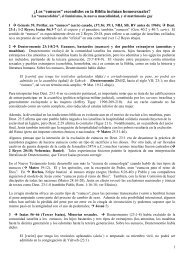Zephaniah - Fundación Otras Ovejas de Argentina
Zephaniah - Fundación Otras Ovejas de Argentina
Zephaniah - Fundación Otras Ovejas de Argentina
You also want an ePaper? Increase the reach of your titles
YUMPU automatically turns print PDFs into web optimized ePapers that Google loves.
However, as David Pleins insists, even though in <strong>Zephaniah</strong> (à Psalms) the classic<br />
vocabulary for the poor acquires spiritual and religious sha<strong>de</strong>s of humility and trust in<br />
Yahweh, we must not create a dichotomy between such sha<strong>de</strong>s and the traditional socio -<br />
economic meanings of poverty and oppression 5 . Humility in <strong>Zephaniah</strong> “es el estado <strong>de</strong>l<br />
pobre y oprimido..., cuya situación es tal que <strong>de</strong>ben reconocer su total <strong>de</strong>bilidad y completa<br />
<strong>de</strong>pen<strong>de</strong>ncia en Dios” 6 (see BJ note Zeph 2:3). According to Pleins, the very same elite<br />
who <strong>Zephaniah</strong> had previously <strong>de</strong>nounced for its idolatry and extravagant and exploitative<br />
lifestyle (1:4-18, esp. 8-9, 11, 13, 18) were left poor and humiliated after the exile. In this<br />
new situation, the exiled elite appropriated the oracles of <strong>Zephaniah</strong> in or<strong>de</strong>r to strengthen<br />
its situation and its faith in Yahweh as the warrior God, liberator of the oppressed (3:16-20;<br />
2:7, 9; Pleins 2001:396).<br />
In addition to the term poor-oppressed (‘ani, 3:12; cf. ‘anawim in 3:3), <strong>Zephaniah</strong><br />
repeatedly refers to oppression. He <strong>de</strong>nounces Jerusalem as a “city of oppressors” (‘anah,<br />
3:1; see “<strong>de</strong>filed”, 1:3) 7 , but promises to those remaining after the Exile “I will <strong>de</strong>al with<br />
your oppressors” (‘anah, 3:19). As for the maximum expression of oppression, <strong>Zephaniah</strong><br />
proclaims the judgment of God against those who “fill their master’s house with violence<br />
(khamas) and fraud” (12:9), and aga inst those priests who “have profaned what is sacred,<br />
they have done violence to the law” (3:4; see RV and NVI). Yahweh’s great day will be a<br />
time when the oppressors will themselves suffer oppression (tsarah I, 1:15, 17), and the<br />
rich will become the poor (1:13; cf. 2:7 and 3:20 “when I restore your fortunes”).<br />
Confronted will al the violence and oppression in Judah and Jerusalem, Yahweh does not<br />
remain passive or indifferent, but his wrath is manifested in the judgment of the Exile<br />
(1:15, 18; 2:1-3; see Ex. 22:21-24). But then, God lets loose his wrath on the oppressor<br />
nations (3:8). Cuando Sofonías refiere a la ira y la con<strong>de</strong>nación, él evita el vocabulario <strong>de</strong><br />
justicia y prefiere hablar <strong>de</strong> “visitar” (paqad) para castigar (1:8 -9, 12; 3:7). But when<br />
<strong>Zephaniah</strong> addresses who suffer oppression and violence, he assures them that Yahweh<br />
manifests his judgments (mishpat) of liberating justice (tsadiq ) each morning (3:5) and<br />
exhorts Judah to seek such justice (tse<strong>de</strong>q) and characteristic humility of the poor (2:3 ). In<br />
addition, utilizing the metaphor of the lame lost sheep, he affirms Yahweh’s solidarity with<br />
the exiled and the crippled (3:19; but see, also, the <strong>de</strong>struction of all the animals in 1:3).<br />
2 Women. As Judith San<strong>de</strong>rson <strong>de</strong>monstrates, <strong>Zephaniah</strong> “jamás alu<strong>de</strong> a ninguna mujer,<br />
nombrado o sin nombre, individualmente o como grupo, en ningún contexto, positivo o<br />
negativo” 8 . Furthermore, she suggests that the reference to the astral cult (1:5) could<br />
inclu<strong>de</strong> feminine <strong>de</strong>ities (à Jer 44). 9 However, when Yahweh appears as the warrior-king<br />
(3:14-20 àHabakkuk), the prophet addresses Jerusalem metaphorically as the the<br />
“daughter Jerusalem” (3:14; RV and NVI literally, contrary to BJ and DHH). With this<br />
city/woman, the warrior Yahweh has sexual relations, and “renews” with his love (3:17; see<br />
the peace that the lovers bring to the male after making love in Song of Songs 8:10; à<br />
Nahum, where Yahweh sexually violates Nineve h). Moreover, as Ulrike Bail points out,<br />
given that “city” is a feminine noun in Hebrew, the Hebrew text of <strong>Zephaniah</strong> abounds with<br />
references to cities as feminine and/or women, and many verbs metaphorically reflect the<br />
i<strong>de</strong>ntities of the cities as women. 10 In this way, The prophet <strong>de</strong>scribes the four Philistine<br />
cities of Gaza, Ashkelon, Ashdod and Ekron (Zeph. 2:4) as a woman
















